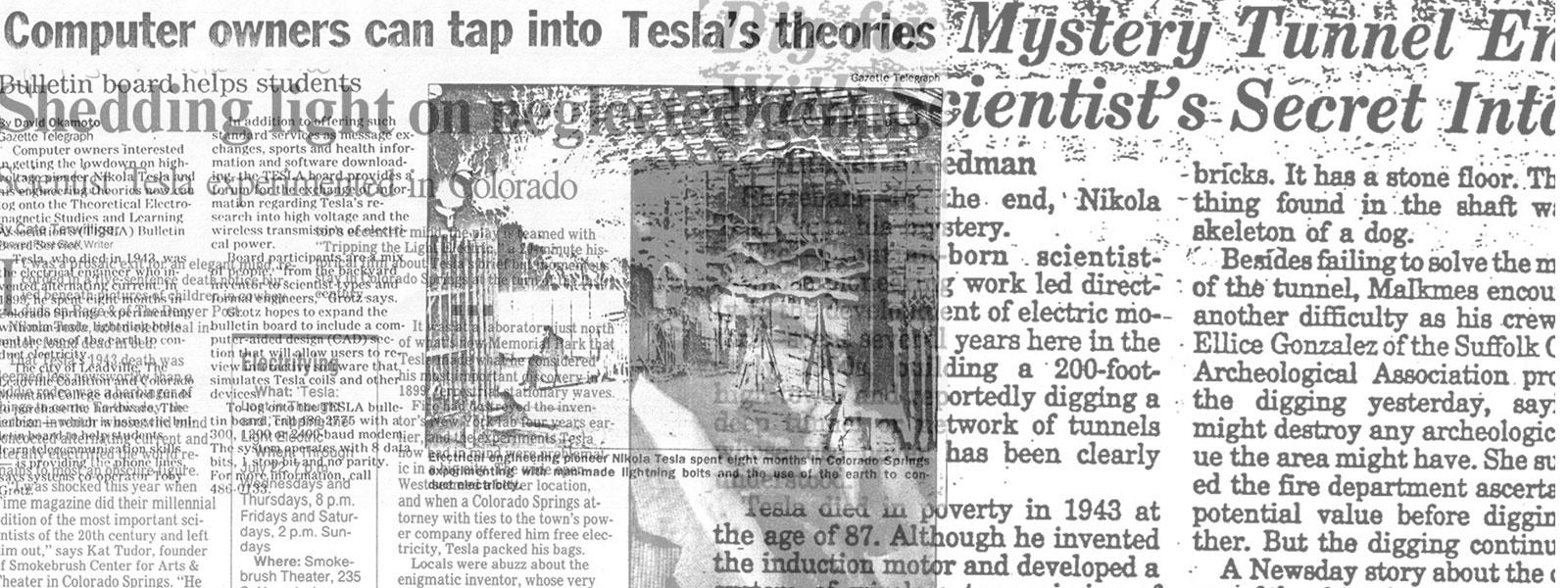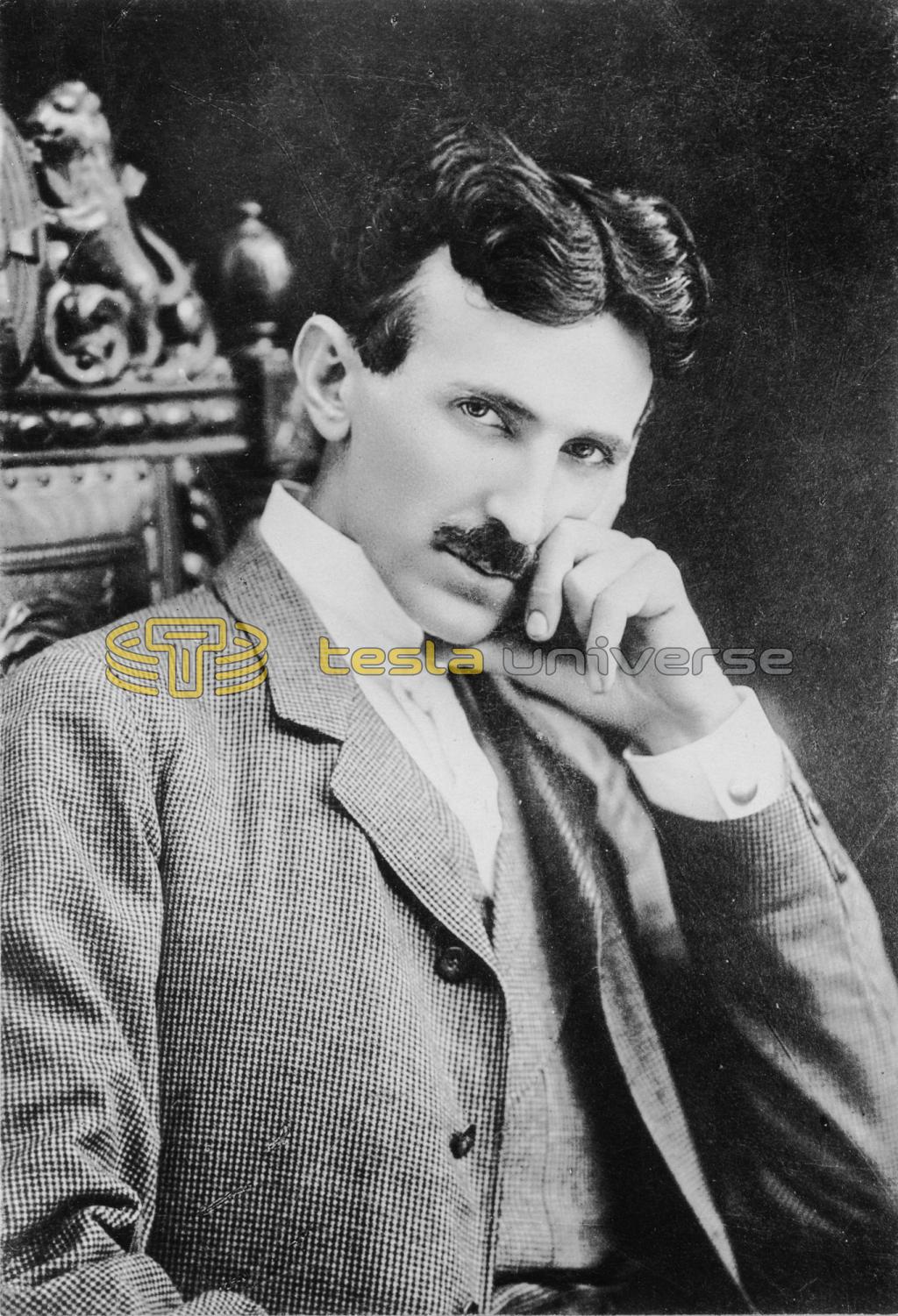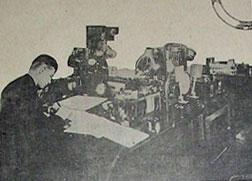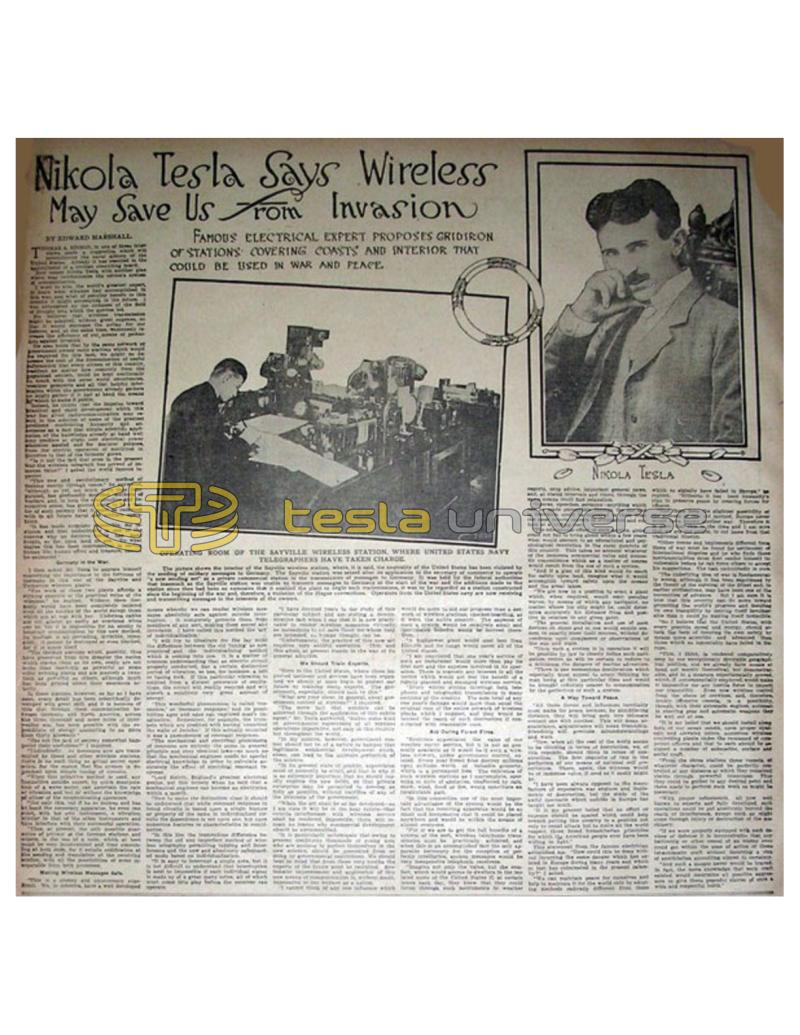
Nikola Tesla Articles
Nikola Tesla Says Wireless May Save Us From Invasion
Famous Electrical Expert Proposes Gridiron of Stations Covering Coasts and Interior That Could Be Used in War and Peace
Thomas A. Edison, in one of these interviews, made a suggestion which will revolutionize the naval history of the United States. Already it has resulted in the appointment of a civilian consulting board.
Now comes Nikola Tesla with another plan which may revolutionize the nation's system of communication.
I went to him, the world's greatest expert, to learn what wireless had accomplished in this war, and what of peculiar benefit to this country it might accomplish in the future. I was astonished by the richness of the field of thought into which the queries led.
He believes that wireless transmission might be adapted, without great expense, so that it would decrease the outlay for our defense, and, at the same time, immensely increase the efficiency of our means of protection against invasion.
He also holds that by the same network of government owned radio stations which would be required for this task, we might so decrease the cost of the dissemination of useful information that every citizen of this country, resident no matter how remotely from the populated centers, could be kept continually in touch with the outer world occurrences, weather prospects and all that helpful information which the government already gathers for might gather if it had at hand the means by which to make it public.
Indeed, he thinks that the impetus toward practical and rapid development which this war has given radio-communication may result in the solution of some of the greatest problems confronting humanity and announces as a fact that simple scientific application of the knowledge already at hand well may produce at slight cost electrical power wherever needed and for maturer purpose, from the electric operation of machines in factories to that of the farmers' plows.
"Is it not the fact that even in the present war the wireless telegraph has proved of immense value?" I asked the world famous inventor.
"This new and revolutionary method of flashing energy through space," he answered, "although, as yet, not much more than inaugurated, has profoundly modified methods of warfare, and, in both the constructive and destructive sense, has proved itself to be a factor of such potency that it must be reckoned with in all future naval and military operations.
"It has made surprises impossible, for instance, and that undoubtedly is one of the reasons why no decisive battle has been fought, so far, upon land or sea. To what degree this has been instrumental in saving human life, human effort and treasure, cannot be estimated."
Germany in the War.
I then asked Mr. Tesla to express himself concerning the importance to the fortunes of Germany in this war of the Sayville and Tuckerton wireless plants.
"The work of these two plants affords a striking example of the practical value of the wireless," he replied. Without them Germany would have been completely isolated from all the nations of the world except those which are at war with her. Undersea cables are cut almost as easily as overhead wires can be, but it is impossible for an enemy to interrupt communication by this new method. Its medium is all pervading, invisible, intangible. It cannot be destroyed or oven blocked, for it is space itself.
"The German stations which, possibly, thus have preserved from dire disaster the nation which claims them as its own, really are not more than one-tenth as powerful as some other existing plants and are scarcely a twentieth as powerful as others, although much has been printed about their enormous activity.
In these stations, however, so far as I have seen, every detail has been scientifically developed with great skill, and it is because of this that through them communication between Germany and North America, across the three thousand and more miles of intervening sea, has been possible with the expenditure of energy amounting to no more than thirty kilowatts."
"Has not the lack of secrecy somewhat hampered their usefulness?" I inquired.
"Undoubtedly. As messages now are transmitted by these and other wireless stations, there is no such thing as actual secret operation, for the reason that the system is dependent upon simple tuning of circuits.
"When this primitive method is used, any inquisitive outside expert, by quick manipulation of a wave meter, can ascertain the rate of vibration and ‘cut in' without the knowledge of either of the communicating operators.
"Not only this, but if he so desires and has at hand the necessary apparatus, he even can start, with his own instrument, a vibration similar to that of the other instruments and thus interfere with their successful operation.
"Thus, at present, the only possible guarantee of privacy at the German stations and others, is the use of a code, which at best must be very inconvenient and time consuming at both ends, for it entails codification at the sending and translation at the receiving station, with all the possibilities of error inseparable from both processes.
Making Wireless Messages Safe.
"This is a clumsy and unnecessary expedient. We, in America, have a well developed
The picture shows the interior of the Sayville wireless station, where, it is said, the neutrality of the United States has been violated by the sending of military messages to Germany. The Sayville station was seized after its application to the secretary of commerce to operate "a new sending set" as a private commercial station in the transmission of messages to Germany. It was held by the federal authorities that inasmuch as the Sayville station was unable to transmit messages to Germany at the start of the war and the additions made to the station since then had been so extensive that it enabled the plant to begin such transmissions, it was to be regarded as a station constructed since the beginning of the war and, therefore, a violation of the Hague conventions. Operators from the United States navy are now receiving and transmitting messages in the interests of the owners.
means whereby we can render wireless messages absolutely safe against outside interruption. It completely protects them from meddlers of any sort, making them secret and inviolable. I have called this method the ‘art of individualization.'
"I will try to illustrate for the lay mind the difference between the old ‘tuning' as now practiced and the ‘individualizing' method which is coming into use. It is a matter of common understanding that an electric circuit properly conducted, has a certain distinctive period of vibration, as has, for instance, a bell or tuning fork. If this particular vibration is emitted from a distant generator of oscillations, the circuit will readily respond and will absorb a relatively very great amount of energy.
"This wonderful phenomenon is called ‘resonance' or ‘resonant response,' and its possibilities ages and ages ago captured man's imagination. Remember, for example, the trumpets which are credited with having ‘crumbled the walls of Jericho.' If this actually occurred it was a phenomenon of resonant response.
"The mechanical and electrical phenomena of response are entirely the same in general principle and obey identical laws - so much so that the mechanical engineer needs no special electrical knowledge in order to calculate accurately the effect of electrical resonant response.
"Lord Kelvin, England's greatest electrical genius, put this tersely when he said that a mechanical engineer can become an electrician within a month.
"Now to make the distinction clear it should be understood that, while resonant response in tuned circuits is based upon a single feature or property of the same in individualized circuits the dependence is not upon one, but upon numerous features or characteristics in combination.
"In this lies the tremendous difference between the old and imperfect, method of wireless telegraphy permitting tapping and interference and the new and absolutely safeguarded mode based on individualization.
"It is easy to interrupt a single note, but it is not difficult to understand that interruption is next to impossible if each individual signal is made up of a great many notes, all of which must come into play before the receiver can operate.
"I have devoted years to the study of this particular subject and am stating a demonstrative fact when I say that it is now practicable to render wireless messages virtually as unreadable to all save those for whom they are intended, as human thought can be.
"Unfortunately, the practice of this new art requires very skillful execution. This, and this alone, at present stands in the way of its general adoption.
We Should Train Experts.
"Here in the United States, where these improved methods and devices have been organized we should at once begin to protect our future by training many experts. The government, especially, should look to this."
"What are your ideas, in general, about government control of wireless?" I inquired.
"The mere fact that wonders can be achieved through the application of this subtle agent," Mr. Tesla answered, "makes some kind of governmental supervision of all wireless operations imperative, not only in this country but throughout the world.
"In my opinion, however, government control should not be of a nature to hamper that legitimate commercial development which, alone, can lead to the ultimate perfection of the science.
"In its present state of crudity, supervision must of necessity be strict, and that is why it is so extremely important that we should rapidly explore the new fields, so that private enterprise may be permitted to develop as fully as possible, without sacrifice of any of the interests of the government.
"When the art shall be so far developed - as I am sure it will be in the near future - that outside interference with wireless service shall be rendered impossible, there will remain no reason why commercial development should be circumscribed.
"It is particularly unfortunate that owing to present conditions thousands of young men who are anxious to perfect themselves in the new science, should be prevented from so doing by governmental restrictions. We should bear in mind that from these very youths the experts of the future must be recruited. Systematic improvement and application of this new means of communication is, without doubt, imperative to our welfare as a nation.
"I cannot think of any one influence which would do more to aid our progress than a network of wireless stations, checker-boarding, as it were, the entire country. The expense of such a system would be relatively small and inestimable benefits would be derived therefrom.
"A highpower plant would cost less than $250,000 and its range would cover all of the United States.
"I am convinced that one year's service of such an instalment would more than pay its first cost and the expense involved in its operation. There is scarcely any interest in all the nation which would not feel the benefit of a rightly planned and managed wireless service.
"Every winter storms interrupt both telephonic and telegraphic transmission in many sections of the country. The sum total of any one year's damage would more than equal the original cost of the entire network of wireless plants which I suggest, and they would be beyond the reach of such destruction if constructed with reasonable care.
Aid During Forest Fires.
"Everyone appreciates the value of our weather report service, but it is not as generally available as it would be if such a wireless network, under government control, existed. Every year forest fires destroy millions upon millions worth of valuable property, which is a permanent loss. The existence of such wireless stations as I contemplate, operating in spite of obstacles, unaffected by rain, snow, wind, flood or fire, would constitute an incalculable gain.
"In this connection one of the most important advantages of the system would be the fact that the receiving apparatus would be so small and inexpensive that it could be placed anywhere and would be within the means of almost everyone.
"For if we are to get the full benefits of a system of the sort, wireless telephonic transmission must be practically achieved, and when this is an accomplished fact the only apparatus necessary for the reception of perfectly intelligible, spoken messages would be very inexpensive telephonic receivers.
"Imagine not only the value, but the comfort, which would accrue to dwellers in the isolated spots of the United States if, at certain hours each day, they knew that they could listen through such instruments to weather reports, crop advice, important general news, and, at stated intervals and times, through the same means could find relaxation.
"Operas, speeches, sermons - anything which can be made perceptible through the ear and is desirable, could be conveyed to them from the most remote centers of civilization and culture at a trifling cost.
"The educational effect of each service, alone, could not fail to bring about within a few years what would amount to an educational and psychological revolution in the rural districts of this country. This takes no account whatever of the immense commercial value and domestic convenience which as a matter of course would result from the use of such a system.
"And if a plan of this kind would do much for safety upon land, imagine what it would accomplish toward safety upon the oceans and the great lakes.
"We are now in a position to erect a plant which, when required, would emit peculiar waves, by means of which any navigator, no matter where his ship might be, could determine accurately his distance from and position in relation to any given point.
"The general installation and use of such devices on shore and at sea would enable seamen to exactly steer their courses, without dependence upon compasses or observations of the sun and stars.
"Once such a system is in operation it will be possible by law to closely define such navigation routes as will be certain to reduce to a minimum the dangers of marine adventure.
"There is one momentous desideratum which especially must appeal to every thinking human being at this particular time and would be brought infinitely nearer to consummation by the perfection of such a system.
A Way Toward Peace.
"All these forces and influences inevitably must make for peace because, by annihilating distance, they will bring men into intimate contact one with another. This will mean acquaintance, acquaintance will mean friendship, friendship will preclude misunderstandings and wars.
"Now, when all the rest of the world seems to be thinking in terms of destruction, we, of this republic, should think in terms of construction. The first requisite of this is the perfection of our means of national self preservation. There, again, the wireless would be of immense value, if used as it easily might be.
"I have been always opposed to the manufacture of expensive war engines and implements of destruction, but the study of the awful spectacle which unfolds in Europe has taught me much.
"It is my present belief that no effort or expense should be spared which could help toward putting this country in a position not only to resist attack but to make all the world respect those broad humanitarian principles for which the American people ever have been willing to fight."
This statement from the famous electrician astonished me. "How could this be done without incurring the same danger which has existed in Europe during many years and which at last has culminated in the present calamity?" I asked.
"We can maintain peace for ourselves and help to maintain it for the world only by adopting methods radically different from those which so signally have failed in Europe," he replied. "Hitherto it has been humanity's plan to preserve peace by creating forces for offense.
"Had there been the slightest possibility of the success of this old method, Europe never would have known another war. Therefore it is plain that this is the time and I am sure that we are the people, to cut loose from that traditional illusion.
"Other forces and implements different from those of war must be found for settlement of international disputes and he who finds these instrumentalities must first render himself invulnerable before he can force others to accept his suggestions. The task undoubtedly is ours.
"The underlying idea of war is fundamentally wrong, although it has been sanctioned by the theory of the survival of the fittest and, in earlier civilizations, may have been one of the necessities of advance. But I am sure it is true that this country can do more toward promoting the world's progress and insuring its own tranquility by making itself invulnerable than it could by making itself invincible.
"So I believe that the United States, with every possible speed and energy, should attack the task of insuring its own safety by means more scientific and advanced than those which so lamentably have failed in Europe.
"This, I think, is rendered comparatively easy by our exceptionally favorable geographical position, and we already have means at hand not merely theoretical, but demonstratable, and in a measure experimentally proved, which, if consequentially employed, would make it impossible for any hostile force to imperil our tranquility. Even now wireless control from the shore of crewless, and, therefore, doubly offensive vessels, is a possibility, though, with their automatic engines, automatic steering gear and automatic weapons they be well out at sea.
"It is my belief that we should install along both of our ocean coasts, upon proper strategic and elevated points, numerous wireless controlling plants under the command of competent officers and that to each should be assigned a number of submarine, surface and aerial craft.
"From the shore stations these vessels, of whatever character, could be perfectly controlled at any distance at which they remained visible through powerful telescopes. Thus they could be guided to any desired point and there made to perform such work as might be necessary.
"With proper refinements, all now well known to experts and fully developed, such operations could be put absolutely beyond the reach of interference, except such as might come through injury or destruction of the machinery.
"If we were properly equipped with such devices of defense it is inconceivable that any battleship or other vessel of an enemy ever could get within the zone of action of these tel-automatic craft without incurring a risk of annihilation amounting almost to certainty.
"And such a danger never would be braved. In fact, the mere knowledge that such craft existed would determine all possible aggressors to give these peaceful shores of ours a wide and respectful berth."


